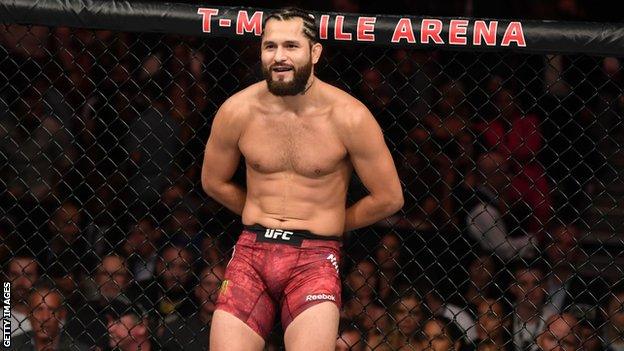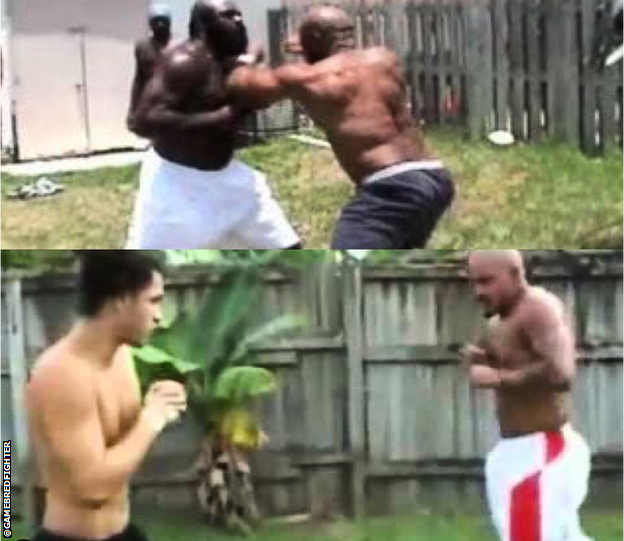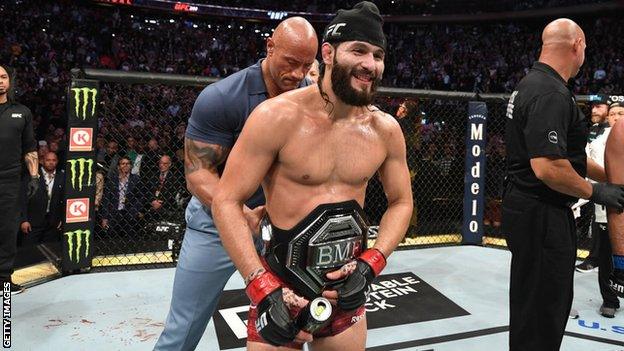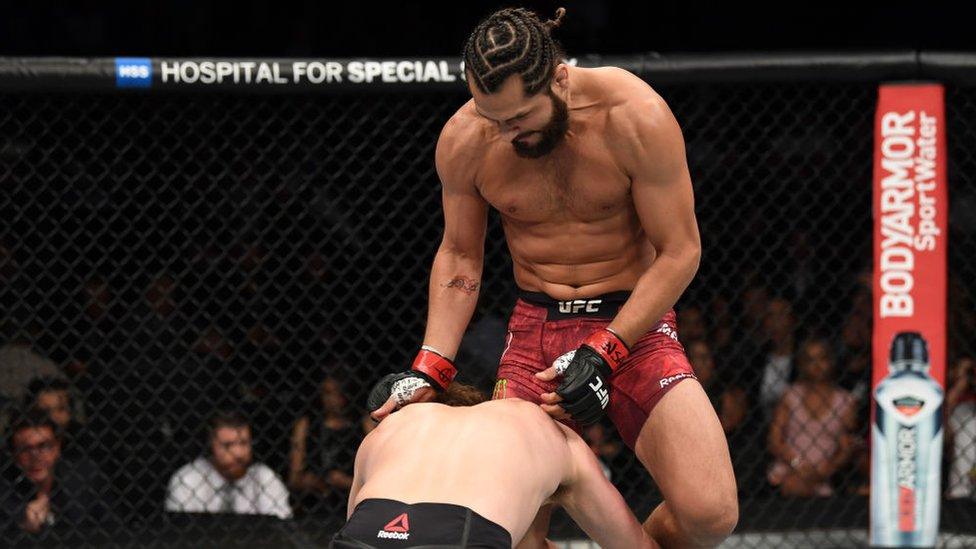Jorge Masvidal: UFC fighter's rise from Miami street fighting scene
- Published
- comments


Masvidal began competing in Miami street fights at the age of 14
Jorge Masvidal relaxed and leaned back against the cage wall, his hands placed nonchalantly behind him. He smiled across at his opponent, calm and quiet. It was in complete contrast to what was about to happen.
The atmosphere at UFC 239 in Las Vegas was subdued when the referee called for the welterweight bout between Masvidal and Ben Askren to get under way last July.
Only murmurs of conversation and the odd whistle of support for the two American fighters could be heard from fans watching at ringside. That all changed in seconds, as a brutal smacking sound ripped throughout the arena
That sound was Masvidal's flying knee knocking Askren out, sending him falling to the canvas as stiff and motionless as a toppled statue. More than 18,000 spectators erupted, united in an outpouring of deafening roars and expressions of shock.
At five seconds, Jorge Masvidal had delivered the fastest knockout in UFC history.
It was a career-defining moment which has elevated the 35-year-old from Miami to the height of his sport. Masvidal is now one of the biggest MMA stars in the world.
And yet, up until that night in Vegas his life and career had largely been defined by a very different type of fighting, in a vastly distant scene.
The story of that transformation begins outside a sun-baked yard behind a laundrette in Miami, 16 years ago.

Masvidal is just waiting. The yard where he's standing is usually empty, but on this day it's brimming with people. There's an eager crowd gathered around two shirtless men about to engage in a mutual combat bare-knuckle fight.
One of the fighters is known as 'Ray'. He's built up a fearsome reputation street fighting in this Florida city. He's six feet tall and weighs around 200 pounds. The fight gets started, and Ray soon clubs his opponent to the concrete ground with a huge right hand.
The crowd bellows in excitement, the bout is quickly over. Ray has won, but he's not finished yet. He looks over towards the ponytailed Masvidal and demands for him to step inside the yard. The main event is on.
"There was never any animosity," Masvidal tells BBC Sport. "It was just fierce competition and two guys going at it. If I'd lost, I would have gone over to him, shook his hand and hugged him."
Masvidal was sat in a McDonalds drive-through when he got the phone call asking if he wanted to fight Ray. The call came from the late Kimbo Slice, a former MMA fighter and boxer who rose to popularity in 2003 by uploading his mutual combat street fights to YouTube. Masvidal drove to the other side of Miami to face Ray that very same day.
"Me and Kimbo, rest in peace, we used to train at the same gym," says Masvidal.
"He'd already seen me working out and we built up a little bit of a connection after talking a couple of times. That's when he asked if I'd like to fight in his backyard. The rest is history."
Masvidal started competing in mutual combat street fights from the age of 14. He was 18 when he took that fight with Ray, in 2004, and he beat him again in a rematch around a year later.
Mutual combat is when two people consensually engage in a fight while not hurting bystanders or damaging property. There is no official law in Florida forbidding it, but it remains a grey area and participants could be charged with various crimes on a case-by-case basis.
Masvidal says he never had any concerns about the legalities around street fighting and mutual combat. He was more than aware, however, of its unpredictable nature.
"I never worried about getting in trouble - we'd both signed up for the same thing," he says.
"I never wanted to seriously hurt anybody, but a backyard fight, you can't control it at all and the things that can happen after the fight are scary. Somebody's friend might get mad, and they might have a knife, or a gun, and there's no doctors or nurses around.
"A professional fight is much safer because your mind is in a totally different place."

Masvidal (pictured here bottom left) has often paid tribute to Kimbo Slice (top picture, left) in social media posts
Masvidal was born in November 1984, in Miami, to two immigrant parents.
His mother had moved to the United States from Peru. His father arrived from Cuba at the age of 14, travelling 90 miles at sea over five days on a makeshift raft made out of a tractor tyre.
Growing up, Masvidal lived and moved around a lot with his mother, but he spent most of his youth in Miami. He saw little of his dad, who was imprisoned for 18 years for drug trafficking offences when Masvidal was only four years old. His mother told him he was away in the army and for nine years their only contact was over the phone. It wasn't until the age of 13 that he found out the truth and started to regularly visit his father in jail.
Despite this, Masvidal says he was close to his family, and he looks back on his childhood with fond memories.
"It was fun man, I had a great childhood," he says. "Maybe we didn't have as much money as the other kids at my schools, but it didn't matter. I had a blast growing up."
Masvidal was hyperactive as a child and so full of energy that his mother banned him from attending his cousins' birthday parties because he caused too much trouble.
He says he fought because it was a way to expend that energy, he loved to compete and it was the only sport he was interested in. Looking back, he remembers the incident that led to his first fight.
"I was about nine years old riding a bike with some friends when we got stopped by a group of guys who were three or four years older than us," he recalls.
"One of the guys leans over, grabs my shirt, pulls out a knife and tells me to give him my bike. I was scared. He had a knife. But there was a fence between us so I pulled back, assessed the situation, then took off.
"Then, five or six months later, there's this incident where my friend got slapped at school, and I asked who's the guy that slapped you? He pointed to the kid and just by luck, I realised it was the same guy who pulled a knife on me.
"We started going at it by the side of the cafeteria. I knew how to throw punches by watching kung-fu movies, and I landed a flurry, plus a head butt which busted his nose."
By the time he was 14, Masvidal had started properly training at a boxing gym after school. He was also attending karate classes and wrestling at high school. In wrestling, Masvidal was good enough for the starting spot on his school team, but he didn't achieve the grades needed to qualify.
At 18, he took his first professional mixed martial arts fight and won via a first round knockout. It was around this time that he met one of the most influential people in his life, Paulino Hernandez.

Masvidal was presented with his 'BMF' title after victory over Nate Diaz in November
Masvidal was mixing unsanctioned street fights with professional fights and Hernandez, a trainer, thought this could damage his potential. He told Masvidal he should put the street fighting scene behind him and focus solely on being a professional fighter.
In 2003, MMA was a long way from the mainstream exposure it has today. It was a niche sport, often perceived as 'too violent' for people outside of its fan base.
The biggest-selling UFC pay-per-view that year was UFC 44, where 90,000 people paid to watch Tito Ortiz against Randy Couture. Conor McGregor and Donald Cerrone's fight in January had more than one million pay-per-views.
Masvidal's striking coach Hernandez trains him to this day and lives with him at his home in Florida.
"Paulino told me 'this street fighting, it can only take you so far and I don't want to take part in that journey'," says Masvidal.
"He said: 'If you stick to the pro lifestyle and compete in sanctioned fights, you can be champion and I'll back you and stand by your side the whole way.'
"It was one of the most important days of my life."
Seventeen years later, Masvidal is a veteran of nearly 50 professional fights in countless promotions. He joined the UFC in 2012 where he has a record of 12 wins and six defeats.
He's currently on a three-fight win streak which started with another stunning knockout victory over Britain's Darren Till in London in March 2019. His most recent fight was a headline bout at UFC 244 in New York against Nate Diaz in November for the inaugural 'BMF' title, which Masvidal won, pocketing a reported $500,000 (£405,000).
Speaking to BBC Sport now, relaxing outside his sun-drenched home in Florida in a lavish pink gown, you sense that Masvidal is enjoying being in the spotlight. He appears confident, but not arrogant. He's yet to win the UFC welterweight title, but has the swagger of a champion.
He is in a luxurious position now where, to a large extent, he can name the price of his fights and choose the opponents he wants to face. It's a position only the hardest-working and durable fighters get to enjoy.
Masvidal believes he might have got here sooner.
"For most of my career, I've carried this stigma of being a street fighter," he says.
"Now the UFC is all over me but let's be honest, they were promoting nothing of me when I first joined. Now, everyone is saying say 'Oh wow you were a street fighter', but back then promotions just didn't like it.
"The stigma meant promotions were always hesitant to promote me. I fought for so many different organisations and promoters, who never wanted to pay you or give you a chance.
"When I started fighting professionals, there was always 'oh he's a street fighter, will he be late for the weigh-in? Maybe he'll miss weight. I've never missed weight. I've never pulled out of a fight.
"Things that uncivilised street fighters have done, I've never done. In a fight for instance, I've never committed a foul that meant I had to get a point taken away from me."

Dhafir Harris, known as Dada 5000, was a kingpin of Miami's underground street fighting scene and set up hundreds of mutual combat fights in his back yard.
Masvidal never fought under Harris, but he did attend some backyard fights as a spectator.
Harris says that, for most of those involved, fighting represented a chance to escape the city's poorer neighbourhoods.
"It was a way out for them," he says. "They'd seen Kimbo Slice do it, so my motto was 'Hey, if he can do it, you can do it.'
"We weren't born with a silver spoon inside our mouths, we were individuals that didn't have the opportunities that other parts of the US had. The backyard was an environment we could work in."
Harris argues that despite the dangers involved in mutual combat fights, like serious injury or going to jail, reward outweighed risk because lives were being saved. He believes it provided people with a way to settle disputes which might otherwise have concluded in bloodshed.
"Once you get that gun out there's no pulling back that bullet - it's done," says Harris.
"And that's what we focused on - being a solution to people's problems. Everybody has problems but not all of us have problem-solving skills."
Harris takes pride in Masvidal's success in the UFC.
"I've always said, if you ever see Jorge Masvidal in a fight with a bear, help the bear," he says.
"Jorge armed himself with the necessary skills to get out there and be the great warrior he is today.
"A guy from the back yard got the fastest knockout in UFC history. That states value."
- Attribution
- Published26 October 2019
